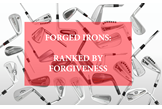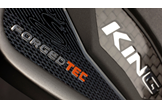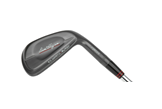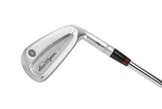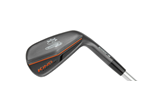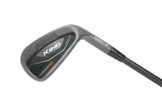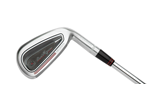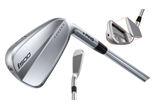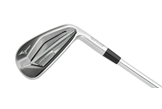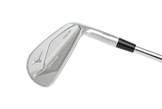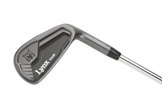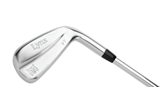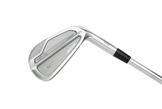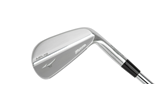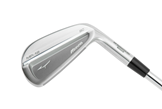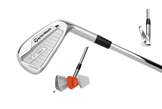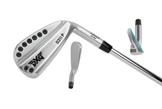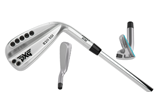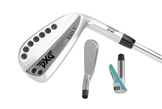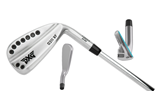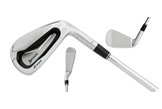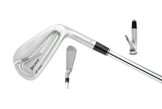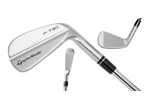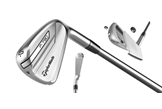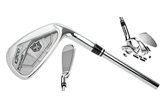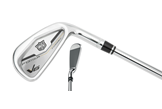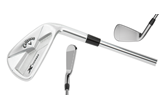Forged irons ranked by forgiveness
Published: Last updated:
Forged Irons: We’ve ranked every leading model and given them a forgiveness rating
Forged irons used to be the domain of decent golfers. Many players, especially those who make it to single digits, see a beautiful set of forgings as the absolute pinnacle of the game.
RELATED: Tested – Best Forged Irons 2020
Why? Forged irons generally have smaller, more compact heads, while the way they’re stamped into shape makes it difficult to build much game improving tech into their design.
But things have changed drastically since PXG introduced hollow forged irons in 2015.
There’s now forged irons aimed at everyone, from Rory McIlroy to 28 handicappers and above. And with three recent high profile launches – Mizuno’s JPX919s, TaylorMade’s P760s and Srixon’s Z series – the timing felt right to review all the leading models in a single test to show you how different they really are.
How we did it:
We asked each brand who make forged irons to send us a 7-iron matched to our test pro Ben Frost’s swing. To ensure you get a complete picture we included blades and the leading forged face models (TaylorMade P790 and Ping i500), as we know they’re really popular right now. Ben hit each iron over two days as our launch monitor gathered data (miss-hits were removed). Once the data had been crunched and comments considered we gave each iron a forgiveness rating from one to five, to help you identify which models are similar, and which might best suit your ability.
Jump to Forgiveness Ratings: 1 / 2 / 2.5 / 3 / 3.5 / 4
Mizuno MP-18 MB iron
RRP: £135 per club 7-iron loft: 34° Category: Player

The numbers:
Ball speed: 118 MPH Launch angle: 17.3° Backspin: 6344 RPM Height: 29 YDS Descent angle: 45° Carry: 166 YDS
TaylorMade P730 iron
RRP: £1049 7-iron loft: 35° Category: Player

The numbers:
Ball Speed: 117 MPH Launch angle: 18.8° Backspin: 6497 RPM Height: 30 YDS Descent angle: 47° Carry: 163 YDS
Callaway Apex MB iron
RRP: £1049 7-iron loft: 34° Category: Player

The numbers:
Ball speed: 119 MPH Launch angle: 17.7° Backspin: 6164 RPM Height: 29 YDS Descent angle: 46° Carry: 166 YDS
Cobra King Pro iron
RRP: £749 7-iron loft: 34° Category: Player

The numbers:
Ball speed: 116 MPH Launch angle: 17.2° Backspin: 5918 RPM Height: 27 YDS Descent angle: 45° Carry: 160 YDS
Ben Hogan FT.Worth Black iron
RRP: £546 + shipping (£31) 7-iron loft: 34° Category: Player

The numbers:
Ball speed: 116 MPH Launch angle: 17.3° Backspin: 6664 RPM Height: 27 YDS Descent angle: 45° Carry: 159 YDS
Category 1 wrap up:
The data averages for our five blade sets (forgiveness rating 1) looks very different to the numbers of our game improvement (category 3) irons. For example, 5mph more ball speed (in favour of the game improver models) can partly be explained by a 2.5° stronger loft.
Yet even with those strong lofts, shots launched and flew at a similar height, and landed at exactly the same descent angle as the blades – but with an extra 12 yards of carry. Sounds pretty good, right? Because blades are so niche we’ve shown our five test models details and data only.
Jump to Forgiveness Ratings: 1 / 2 / 2.5 / 3 / 3.5 / 4
Category 1 averages:
|
Iron model |
Ball Speed |
Launch Angle |
Backspin |
Height |
Descent Angle |
Carry Distance |
|
Mizuno MP-18 MB |
118 MPH |
17.3° |
6344 RPM |
29 YDS |
45° |
166 YDS |
|
TaylorMade P730 |
117 MPH |
18.8° |
6497 RPM |
30 YDS |
47° |
163 YDS |
|
Callaway Apex MB |
119 MPH |
17.7° |
6164 RPM |
29 YDS |
46° |
166 YDS |
|
Cobra King Pro |
116 MPH |
17.2° |
5918 RPM |
27 YDS |
45° |
160 YDS |
|
Ben Hogan FT.Worth Black |
116 MPH |
17.3° |
6664 RPM |
27 YDS |
45° |
159 YDS |
|
CATEGORY AVERAGE |
117 MPH |
17.7° |
6317 RPM |
28 YDS |
46° |
163 YDS |
REVIEW: Mizuno MP-18 SC iron
RRP: £135 per club Availability: 3 – PW Stock shaft: Choose from 16 premium options 7-iron loft: 34° Category: Player

You need to know:
A compact cavity back, which sits seamlessly alongside an MP-18 muscleback. A slightly wider cambered sole is more playable than the MB, yet the SC thanks to a thin tapered top line, short head length and compact wedges are very much a tour-ready iron. Grain flow forged for outstanding feel and feedback.
The numbers:
Ball speed: 120 MPH Launch angle: 17.7° Backspin: 5521 RPM Height: 30 YDS Descent angle: 45° Carry: 176 YDS
We say:
Our test pro is a big fan of smaller headed irons so the SC were right up his street. Mizuno reckon the SC offers similar amounts of forgiveness and playability as the new JPX919 Tour, and even though a few shots were hit low in the face we got some decent results, suggesting the SC has a degree of playability. Ben also liked the squareness of the SC’s top edge, which gives a real traditional look; it’s a little wider than the JPX919 Tour which for some will boost confidence.
Full Mizuno MP-18 SC iron review here
Verdict:
When it comes to forged irons it’s difficult to see past Mizuno, especially as a good number of pros now put them in play, unpaid. The choice between SC and JPX919 Tour is tough. We fall just on the side of the Tour; we like the finish, it’s got a thinner top edge and they’re going to be around for two years, where MP-18 is likely to be updated in 2019.
REVIEW: Srixon Z 785 iron
RRP: £799 (s) £899 (g) Availability: 3 – PW, AW, SW Stock shaft: Nippon NS Pro Modus Tour 105/120 (s) Miyazaki Kaula 8 (g) 7-iron loft: 32° Category: Player

You need to know:
A compact players shape gives a blade-like appearance at address. Srixon keep MOI lower to improve workability (with more mass directly behind the impact zone), a request from their tour staff. Forged from a single piece of 1020 carbon steel 785s have laser milling between each face groove to maximise consistency and stopping power, particularly from the rough.
The numbers:
Ball speed: 121 MPH Launch angle: 16.9° Backspin: 5024 RPM Height: 29 YDS Descent angle: 43° Carry: 179 YDS
We say:
Srixon have refocused their attention to the tour and better player market, and the new Z 785s are everything a decent player wants. They sit beautifully behind the ball, look simple and unfussy and feel every bit as good as any forged iron we’ve hit. It should be no surprise then Srixon were the fastest growing iron brand in the UK last year. From all the irons with a Forgiveness rating of 2, the Z 785’s produced our test pro’s longest average carry distance (179 yards) without being the strongest loft, which is seriously impressive.
Full Srixon Z 785 iron review here
Verdict:
A lovely subtle, traditional styled players iron with some serious performance for decent golfers. In the current market the price tag represents really good value for money, especially when you factor in 12 premium shaft options at no extra cost.
REVIEW: PXG 0311 T Gen 2 iron
RRP: from £400 per club Availability: 3 – PW Stock shaft: N/A – PXG insist on fitting you to the best option 7-iron loft: 32° Category: Player

You need to know:
Tour-inspired, with a blade size and appearance mean T is suited to players interested in maximum workability. A filled CNC milled internal cavity offers a degree of forgiveness while improving feel and sound. PXG say the T model is typically suited to players generating higher club speeds.
The numbers
Ball speed: 120 MPH Launch angle: 16.5° Backspin: 4956 RPM Height: 28 YDS Descent angle: 42° Carry: 177 YDS
We say:
“T” stands for tour performance, but don’t think all PXG pros use them. Zach Johnson does, whereas Pat Perez plays the more forgiving XF. PXG like to fit on attack angle so the narrow-soled T is suited to those hitting down on irons, whereas wider soles can be a better match for shallower attack angles. We’re big fans of PXG – yes they cost a fortune, but we love how they come to fit you and are all about creating a premium product, no matter how much it costs.
Full PXG 0311 T Gen 2 iron review
TG verdict:
Even though the T is PXGs smallest (and lowest MOI) iron our test pro hit them into his tightest dispersion circle in our recent hollow body iron test. They’re the brand who’ve shone the spotlight on the benefits of hollow body tech, and it’s testament to their two lead engineers that forgiving blades really are a reality nowadays.
REVIEW: Wilson Staff FG Tour V6 iron
RRP: £699 Availability: 3 – PW Stock shaft: True Temper Dynamic Gold AMT 7-iron loft: 35° Category: Player

You need to know:
20g of tungsten weighting in the 3-7 iron lowers the centre of gravity, increasing launch angle without adding spin. It means a higher peak height in the long and mid irons and a steeper descent angle for attacking the pin. Each head is forged from 8620 carbon steel for ultimate feel and feedback.
The numbers:
Ball speed: 119 MPH Launch angle: 17.7° Backspin: 5721 RPM Height: 29 YDS Descent angle: 45° Carry:171 YDS
We say:
The V6 throws up a real conundrum as its tiny head is one of the smallest we tested, yet from the weakest loft of the category (forgiveness two irons) it produced a spot-on average performance, which says it’s punching well above its weight. Wilson have rinsed every last drop of performance out of the V6, which probably explains why Padraig Harrington swears by his.
Full Wilson Staff FG Tour V6 iron review here
TG verdict:
Take nothing away from the V6, it is a strong performer. It might not be our first choice, but it’s down to purely subjective ingredients like head shaping and polished, shiny finishes. The numbers speak for themselves, and as they’ve been in Wilson’s range for two years, you might well find a set very soon for very sensible money.
REVIEW: TaylorMade P760 iron
RRP: £1299 Availability: 3 – PW Stock shaft: True Temper Dynamic Gold 120 7-iron loft: 33° Category: Player

You need to know:
The P760s are brand new and replace TaylorMade’s P750 and P770 irons. The 8-PW are forged from a single piece of 1025 carbon steel, whereas the 3-7 irons have hollow internal cavities, with SUS630 faces to maximise ball speed. TaylorMade say the P760s are a progressive design with each being individually optimised to deliver tour calibre performance and shaping.
IRON FITTING: TaylorMade P760 vs PSi Tour
The numbers:
Ball speed: 120 MPH Launch angle: 17.4° Backspin: 5809 RPM Height: 29 YDS Descent angle: 45° Carry: 172 YDS
We say:
We’ve been massive fans of TaylorMade’s P790 irons since they launched last year and P760 are a more compact version, aimed at very good players. Hence the forgiveness rating of 2. We only tested the 7-iron (which has the smallest internal cavity) but our test pro loved the heads straight edges and combo satin and polished finish. There’s a good bit of difference between the data, compared to the P790s which we reckon is needed to give golfers a real choice between the two.
Learn more about the TaylorMade P760 irons here
TG verdict:
Player irons are less often bought on data and much more on feel, feedback and shaping. If you want to consider numbers, P760 despite its compact size is right there in the running among the very best in this category. It’s logical to expect the hollow long and mid irons to have slightly better forgiveness on mishits than a standard small cavity back player iron.
REVIEW: Mizuno JPX919 Tour iron
RRP: £135 per club Availability: 3 – PW Stock shaft: Choose from 16 premium options 7-iron loft: 34° Category: Player

You need to know:
HD forging (for the first time in the JPX family) squeezes grain structure closer together lower in the blade (where shots are hit) improving feel. A new “open heel” frees up 5g of weight, helping improve forgiveness. The top edge is 10% thinner, a slightly wider more cambered sole improves turf interaction and there’s a sleeker, less grainy finish.
BLADE v Cavity irons with Sir Nick Faldo and the Mizuno JPX919s
The numbers:
Ball speed: 120 MPH Launch angle: 17° Backspin: 6225 RPM Height: 29 YDS Descent angle: 46° Carry: 169 YDS
We say:
The new 919 Tour has massive shoes to fill as its predecessor is a firm favourite on tour. Our test pro loved the narrower top edge, feeling it completes the look of what’s expected from this type of iron. The more sculpted sole improves the new 919 even if only a tiny percentage of golfers will notice the difference. For us, the Tour was fractionally higher spinning than our test average and shots descended more steeply, which says it’s well equipped for some accurate shot making and stopping approaches tight to the flag.
Full Mizuno JPX919 Tour iron review here
TG verdict:
A stunning iron. The 919 Tour, along with the other five models in the JPX and MP family, make up in our opinion Mizuno’s strongest ever iron line up. We just wish we were good enough to use a set –you’ll need to be close to low single figures to get the best out of them consistently.
REVIEW: Callaway X-Forged iron
RRP: £1049 Availability: 3 – PW Stock shaft: Project X (s) 7-iron loft: 33° Category: Player

You need to know:
Designed with input from Callaway’s tour staff, X Forged incorporates a small cavity back for extra playability over the Apex MBs. Tour configured soles improve turf interaction, and clean, smooth lines give an appealing look at address. “20V” grooves are said to maximise spin consistency for controlled shot-making.
The numbers:
Ball speed: 120 MPH Launch angle: 17.7° Backspin: 5384 RPM Height: 30 YDS Descent angle: 44° Carry: 176 YDS
We say:
If you’re a fan of straight edges overs curves and compact head shapes when it comes to irons, X-Forged should be right up your street. Our test pro reckoned he got a towering ball flight, which is supported by how he launched and peaked shots out alongside the highest in the category (forgiveness 2) from what isn’t the weakest loft. They’re powerful when it comes to ball speed and carry, too. We reckon feel was more solid than soft, which isn’t a criticism. We loved the sleek satin finish, too.
Full Callaway X Forged iron review here
TG verdict:
As gorgeous as the X-Forged are, the fact that tour players have played a big hand in their development says to us they’re only really suited to elite golfers. By that we mean low single figures and better. If that’s you we’re envious because we wish we had the ability to play these ourselves.
REVIEW: Lynx Prowler CB iron
RRP: £675 Availability: 3 – PW (5 – PW stock set) Stock shaft: KBS Tour 7-iron loft: 31° Category: Player

You need to know:
Forged from 1020 carbon steel, the Forged CB are designed to deliver a penetrating ball flight with excellent feel, feedback and forgiveness. Available in both a satin chrome and gunmetal finish.
The numbers:
Ball speed: 123 MPH Launch angle: 16.4° Backspin: 6014 RPM Height: 30 YDS Descent angle: 45° Carry: 176 YDS
We say:
The CB didn’t quite make it into our Top 10 Player irons of 2018, but based on our results it’s a very solid performer for sensible money. The edges of the heads are very clean and defined and not rounded like some, which gives a really crisp appearance. There’s absolutely no mention of any spring or fast face tech so it’s impressive the CB posted a ball speed 3mph quicker than the test average (albeit from the strongest loft in the category). Our test pro reckoned feel and feedback were sound.
Full Lynx Prowler CB iron review here
TG verdict:
A lovely, well constructed iron from Lynx. For anyone struggling to decide between the CB and Lynx’s hollow body Prowler VT, we reckon the CBs are probably a tad more forgiving, but our test pro just about preferred the looks and head shaping of the VT.
Jump to Forgiveness Ratings: 1 / 2 / 2.5 / 3 / 3.5 / 4
Category 2 averages:
|
Iron model |
Ball Speed |
Launch Angle |
Backspin |
Height |
Descent Angle |
Carry Distance |
|
Mizuno MP-18 SC |
120 MPH |
17.7° |
5521 RPM |
30 YDS |
45° |
176 YDS |
|
Srixon Z785 |
121 MPH |
16.9° |
5024 RPM |
29 YDS |
43° |
179 YDS |
|
PXG 0311 T Gen 2 |
120 MPH |
16.5° |
4956 RPM |
28 YDS |
42° |
177 YDS |
|
Wilson Staff FG Tour V6 |
119 MPH |
17.7° |
5721 RPM |
29 YDS |
45° |
171 YDS |
|
TaylorMade P760 |
120 MPH |
17.4° |
5809 RPM |
29 YDS |
45° |
172 YDS |
|
Mizuno JPX919 Tour |
120 MPH |
17° |
6225 RPM |
29 YDS |
46° |
169 YDS |
|
Callaway X-Forged |
120 MPH |
17.7° |
5384 RPM |
30 YDS |
44° |
176 YDS |
|
Lynx Prowler CB |
123 MPH |
16.4° |
6014 RPM |
30 YDS |
45° |
176 YDS |
|
CATEGORY AVERAGE |
120 MPH |
17.2° |
5582 RPM |
29 YDS |
44° |
175 YDS |
REVIEW: PXG 0311 P Gen 2 iron
RRP: from £400 per club Availability: 3 – PW, GW Stock shaft: N/A – PXG insist on fitting you to the best option 7-iron loft: 31° Category: Player

You need to know:
A great balance of playability and forgiveness, with a head size that appeals to a wide audience of golfers. A larger internal cavity (than PXG’s T model) means more forgiveness, but thanks to the cavity filling there’s no sacrifice in feel or sound. A moderate sized, blade-style head with a balanced sole width to accommodate multiple swing styles.
The numbers:
Ball speed: 120 MPH Launch angle: 16.4° Backspin: 5223 RPM Height: 28 YDS Descent angle: 42° Carry: 177 YDS
We say:
PXG irons are into their second generation, but the original P can lay claim to being the club that ignited the fire under hollow body irons. Many golfers won’t stomach the cost of PXG, and that’s fine. But we undeniably love the feeling of pulling a “players” iron (the P) from the bag, safe in the knowledge we’re not putting our game under undue pressure by doing so. P is a cracking iron for swathes of well-heeled reasonable club golfers.
Full PXG 0311 P Gen 2 iron review
TG verdict:
Don’t even try and justify the extra cost of PXG irons in terms of gains in performance –the decision won’t make sense on paper. PXG know buying comes down to much more than just numbers on a launch monitor; they’re selling the dream. If we had the cash we’d want to be in the club, too. If everyone had a set though would they be quite so desirable…?
REVIEW: Mizuno MP-18 MMC iron
RRP: £150 per club Availability: 3 – PW, GW Stock shaft: Choose from 16 premium options 7-iron loft: 32° Category: Player / Game improver

You need to know:
It took Mizuno’s craftsmen three years to work out how to make the multi-material MMC. 20g of tungsten in the toe raises playability, and a titanium badge removes extra mass from the cavity, improving forgiveness. Mizuno reckon the MMC offers similar levels of forgiveness to Ping’s cavity-backed Eye 2 iron from years ago, which is seriously impressive from such an attractive head.
The numbers:
Ball speed: 120 MPH Launch angle: 15.6° Backspin: 5806 RPM Height: 27 YDS Descent angle: 42° Carry: 173 YDS
We say:
The MMC doesn’t have the same flex face tech as some of the other irons in the 2.5 forgiveness category, yet it did a decent job of holding its own in terms of ball speed and carry distance. A good amount of spin means shots will still stop on a green, even though the MMC posted one of the shallowest descent angles of the irons we tested. The sole width is pretty narrow so we reckon you still need to be a decent ball striker to get the best out of them.
Full Mizuno MP-18 MMC iron review here
TG verdict:
A cracking iron that blurs the line between player irons and game improvement models. A definite rise in playability over the MP-18 SC means we reckon you can expect to see levels of forgiveness along the lines of a TaylorMade P790. A brilliant option for improving golfers up to a 10 or 12 handicap.
TESTED: Titleist Pro V1 vs Mail order golf balls
REVIEW: Wilson Staff C300 Forged iron
RRP: £599 (s) £799 (g) Availability: 3 – PW, GW Stock shaft: KBS Tour 105 (s) Fujikura Pro 85 (g) 7-iron loft: 33° Category: Player / Game improver

You need to know:
Wilson say the C300 Forged is the first to incorporate power hole technology in an 8620 carbon steel iron head. It means you get the same feel as Wilson’s excellent tour-level FG Tour V6, but with extra ball speed and additional playability. Five power holes in a double row on the sole increase face flex.
The numbers:
Ball speed: 123 MPH Launch angle: 17.5° Backspin: 6032 RPM Height: 32 YDS Descent angle: 46° Carry: 177 YDS
We say:
Look at our data and the C300 Forged is an absolute top performer for our test pro. It produced the fastest ball speed among the irons ranked with a 2.5 forgiveness (and joint fastest ball speed among the full forged irons we tested), along with a high, soaring flight and steep descent angle, which in anyone’s book is an excellent all-round performance. The slight fly in the ointment is the shiny, heavily rounded head shape which struggled to really win our test pro over, even though he liked the feel.
Full Wilson Staff C300 Forged iron review here
TG verdict:
A very high-tech forged iron, which demonstrates perfectly how far forged iron technology has come. Wilson can be an acquired taste when it comes to head shapes. If you’re a fan, the sub-£600 price tag for this sort of feel and performance blend is very impressive.
THE TRUTH ABOUT STRONG LOFTED IRONS
REVIEW: Cobra King Forged Tec iron
RRP: £799 Availability: 3 – PW, GW Stock shaft: True Temper AMT White (s) UST Maimiya Recoil ES (g) 7-iron loft: 30° Category: Player

You need to know:
The TEC has a thin forged 4140 Chromoly steel face for explosive ball speeds. Tungsten weights in the toe and heel help improve off-centre hit forgiveness for this style of iron. A carbon cavity badge improves feel and sound by dampening vibration. A DBM black finish is said to be more durable than PVD models.
The numbers:
Ball speed: 121 MPH Launch angle: 15.6° Backspin: 5336 RPM Height: 27 YDS Descent angle: 42° Carry: 176 YDS
We say:
Cobra deserve a hearty pat on the back for their forged irons over the last few years. They’ve focused on small improvements across the board and as most know the devil is in the detail. The black finish grew on our test pro, and he really liked the painted bottom groove which was great for focusing attention and helping alignment. The head gives the impression of being a bit bigger and longer in blade length but the dark finish helps disguise the size really cunningly.
TG verdict:
The TEC has the strongest loft (7-iron) of all the player irons we tested. It comes then as no surprise that shots peaked out lower than average for the category along with a shallower descent angle. We reckon they’re particularly well suited to golfers specifically chasing extra distance, or those generating above average backspin numbers.
REVIEW: Ben Hogan PTx iron
RRP: £601.15 + shipping (£31.10) Availability: 3 – PW, AW, SW Stock shaft: Choose from 4 premium options 7-iron loft: Choose from 32° / 33° / 34° / 35°(we tested the 33° model) Category: Player

You need to know:
Tradition meets technology. A complex construction means the long irons have hollow frames with thin steel faces, where titanium cores in the shorter scoring clubs remove inefficient weight, optimising perimeter weighting for precise shot making. Four different launch profiles mean you tailor lofts to how you play the game.
The numbers:
Ball speed: 116 MPH Launch angle: 16.5° Backspin: 5295 RPM Height: 25 YDS Descent angle: 41° Carry: 166 YDS
We say:
We’ve not tested Ben Hogan clubs for years; the brand’s gone through serious changes in the USA. You won’t find Hogan in pro shops, as they’re ordered direct from the factory on the internet. It cuts out retailer margins and means you get very competitive pricing. Whether golf clubs should be sold direct to consumers over the internet is a different debate, but we absolutely loved the PTx. The head shaping is second to none, the technology story is compelling and no matter whether you want standard, strong or weak lofts, there’s a launch profile to suit everyone.
Full Ben Hogan PTx iron review
TG verdict:
It’s a leap of faith buying high value goods on the web, especially when the seller isn’t on this side of the Atlantic. If you have a good idea of your specs and aren’t afraid to order online, with no fitting, the PTx are beautiful. Not the fastest or longest, but gorgeous. Against other premium forged irons you’re likely to save yourself a couple hundred pounds, too.
Everything you need to know about shaft weight and why it’s now more important than flex.
Jump to Forgiveness Ratings: 1 / 2 / 2.5 / 3 / 3.5 / 4
Category 2.5 averages:
|
Iron model |
Ball Speed |
Launch Angle |
Backspin |
Height |
Descent Angle |
Carry Distance |
|
Mizuno MP-18 MMC |
120 MPH |
15.6° |
5806 RPM |
27 YDS |
42° |
173 YDS |
|
PXG 0311 P Gen 2 |
120 MPH |
16.4° |
5223 RPM |
28 YDS |
42° |
177 YDS |
|
Wilson Staff C300 Forged |
123 MPH |
17.5° |
6032 RPM |
32 YDS |
46° |
177 YDS |
|
Cobra King Forged Tec |
121 MPH |
15.6° |
5336 RPM |
27 YDS |
42° |
176 YDS |
|
Ben Hogan PTx |
116 MPH |
16.5° |
5295 RPM |
25 YDS |
41° |
166 YDS |
|
CATEGORY AVERAGE |
120 MPH |
16.3° |
5538 RPM |
28 YDS |
43° |
174 YDS |
REVIEW: Mizuno JPX919 Forged iron
RRP: £135 per club Availability: 4 -PW Stock shaft: Choose from 16 premium options 7-iron loft: 32° Category: Game improver

You need to know:
Like the JPX919 Tour, the Forged has HD forging which improves feel for shots hit low in the blade which wasn’t in the previous model. Mizuno’s engineers have developed a clever reverse-milling technique (going through the sole) which allows them to thin down the face to maximise ball speeds from a larger area. An “open heel” lets vibration waves out, improving feel.
The numbers:
Ball speed: 120 MPH Launch angle: 17.4° Backspin: 6216 RPM Height: 30 YDS Descent angle: 46° Carry: 169 YDS
We say:
Very simply the JPX919 Forged is THE forged iron for the golfing masses – club golfers who really want a forged iron, but possibly aren’t the best ball strikers. The head is longer from toe to heel with extra offset (than the Tour), but when you understand Nick Faldo plays the Forged’s older brother (JPX900) you realise just how versatile it is, and what a wide audience of golfers it appeals to. Srixon’s Z 585, the only other iron in this category (forgiveness rating 3), paints a picture of how much more ball speed a springy clubface can bring to the party, if extra yardage is a priority.
TG verdict:
From quite a strong 7-iron loft the JPX peaked shots out two yards higher than the average blade, dispelling the myth that strong lofted irons only fly low with less spin. 3mph more ball speed, yet the same descent angle as a blade, is impressive and shows beautifully how modern technology helps golfers hit shots further while still getting them to stop.
Full Mizuno JPX919 Forged iron review here
REVIEW: Srixon Z 585 iron
RRP: £799 (s) £899 (g) Availability: 3 – PW, AW, SW Stock shaft: Nippon Modus 3 105 (s) Miyazaki Kaula 8 (g) 7-iron loft: 31° Category: Game improver

You need to know:
A forged 1020 body is combined with a springy 1mm thick SUP10 face. A speed groove around the back of the face improves face flex and rebound. Srixon badge the Z 585 as “Feel with Distance”. The Tour VT sole gives consistent smooth turf interaction, while laser milled grooves produce maximum stopping power from the rough as well as the fairway.
The numbers:
Ball speed: 123 MPH Launch angle: 17.5° Backspin: 5448 RPM Height: 31 YDS Descent angle: 45° Carry: 180 YDS
We say:
Admittedly the Z 585s sound different, compared to the single piece Mizuno JPX919 Forged (the only other iron in this forgiveness category), but it’s really not offensive, and something lots of golfers would already be accustomed to if they’ve tried fast face irons before. Both Srixon’s new Z Series irons put in a serious shift during our test and were mightily impressive in terms of data. The head shaping is spot on, there’s plenty of Japanese know-how built into every detail and it’s all wrapped up in a subtle non-blingy shell, which will look at home in any reasonable golfer’s bag.
Full Srixon Z 585 iron review here
TG verdict:
Srixon are more focused on tour and better player equipment than ever, and it speaks volumes the new Z 585 has received the tiniest of tweaks over its predecessor. Srixon know their irons are brilliant, and they’re building momentum to convince more golfers to give them a try. With prices on the increase the Z 585s look like decent value to us, too.
Jump to Forgiveness Ratings: 1 / 2 / 2.5 / 3 / 3.5 / 4
Category 3 averages:
| Iron Model |
Ball Speed |
Launch Angle |
Backspin |
Height |
Descent Angle |
Carry Distance |
|
Mizuno JPX919 Forged |
120 MPH |
17.4° |
6216 RPM |
30 YDS |
46° |
169 YDS |
|
Srixon Z585 |
123 MPH |
17.5° |
5448 RPM |
31 YDS |
45° |
180 YDS |
|
CATEGORY AVERAGE |
122 MPH |
17.5° |
5832 RPM |
30.5 YDS |
46° |
175 YDS |
REVIEW: PXG 0311 XF Gen 2 iron
RRP: from £400 per club Availability: 3 – PW, GW, SW, LW Stock shaft: N/A – PXG insist on fitting you to the best option 7-iron loft: 30° Category: Game improver

You need to know:
Extreme forgiveness, say PXG, but while maintaining the sleek look and superior feel of a blade. A large internal cavity and slightly longer blade with extra offset mean extreme forgiveness, while a thin top rail maintains a great look. A moderately wide sole improves impact consistency.
The numbers:
Ball speed: 123 MPH Launch angle: 17° Backspin: 5170 RPM Height: 30 YDS Descent angle: 44° Carry: 183 YDS
We say:
We’ve tested the XF a couple of times now and it’s really good – exactly what wasn’t available in the forged iron market before PXG came along. The head is oversized and stretched from toe to heel, but you’ll be delighted at how good it looks at address. For our pro it generated a little less backspin, yet still peaked shots out nice and high with an average descent angle, which means you’ll have little difficulty holding greens. By tying for fastest average ball speed, with four other models (excluding the forged face/cast body irons) PXG are on to something.
Full PXG 0311 XF Gen 2 iron review
TG verdict:
Unlike most other fitting stories we’ve heard, PXG like to look at how you present the head at impact, not your handicap. If you’re an enthusiastic but not brilliant golfer who hates how forged irons have been tailored to the best players for years, these will go along way to changing your thinking forever.
REVIEW: Ben Hogan Edge iron
RRP: £573.83 + shipping (£31.10) Availability: 4 – PW Stock shaft: Choose from 4 premium options 7-iron loft: 34° Category: Game improver

You need to know:
Perimeter weighting is difficult to incorporate into one-piece forged irons. So Hogan have created the Edge as two pieces (the hosel and body are created separately from the face). It’s an expensive technique but means precise and efficient perimeter weighting. A polycarbonate foam inside gives a solid feel, even though the heads are 12% bigger than Hogan’s PTx iron.
The numbers:
Ball speed: 119 MPH Launch angle: 17.9° Backspin: 6904 RPM Height: 30 YDS Descent angle: 47° Carry: 164 YDS
We say:
Hogan have always been about tradition, but more than ever they’re including some seriously good new tech to help you play better. The Edge is much more than your average game improvement iron. It wasn’t fastest or longest (you wouldn’t expect it to be from the same 7-iron loft as our average blade). But for golfers wanting a cracking looking cavity back which is also forgiving, it’s fantastic.
Full Ben Hogan Edge iron review here
TG verdict:
We hope Ben Hogan’s buying model takes off because these irons are top drawer. We hear a lot from golfers who don’t want strong lofts or models being updated every 12 months. If that’s you, Hogan are a brand you really should take a look at. They’re doing things the old fashioned way, with a modern twist.
Jump to Forgiveness Ratings: 1 / 2 / 2.5 / 3 / 3.5 / 4
Category 3.5 averages
|
Iron Model |
Ball Speed |
Launch Angle |
Backspin |
Height |
Descent Angle |
Carry Distance |
|
PXG 0311 XF Gen 2 |
123 MPH |
17° |
5170 RPM |
30 YDS |
44° |
183 YDS |
|
Ben Hogan Edge |
119 MPH |
17.9° |
6904 RPM |
30 YDS |
47° |
164 YDS |
|
CATEGORY AVERAGE |
121 MPH |
17.5° |
6037 RPM |
30 YDS |
46° |
174 YDS |
REVIEW: PXG 0311 SGI Gen 2 iron
RRP: from £400 per club Availability: 4 – PW, GW, SW, LW Stock shaft: N/A – PXG insist in fitting you to the best option 7-iron loft: 29° Category: Super game improver

You need to know:
Ideal for those who want the definitive “easy to use” iron. A long blade length, low profile, the most offset of any PXG iron and a thicker top rail all combine to inspire confidence. The forged body with internal cavity is CNC milled in exactly the same way as PXG’s other irons.
The numbers:
Ball speed: 123 MPH Launch Angle: 17.5° Backspin: 5121 RPM Height: 31 YDS Descent angle: 45° Carry: 183 YDS
We say:
PXG would never fit our test pro for a set of the low profile SGIs, but we really wanted to show just how different forged irons can be, so they kindly let us include all four of their models in this test. And it’s fair to say he had a whale of a time launching shots down the range with them. Balls soared into the air on a forgiving flight, and thanks to the height they literally fell onto the green. All that height didn’t cost distance, either. The SGI and XFs were our longest carrying forged irons (not including the forged face/cast hollow head irons).
Full PXG 0311 SGI Gen 2 iron review
TG verdict:
Logic says our pro shouldn’t like irons at this end of the spectrum; he’s a traditional blade fan. But he really did like hitting them. He even said if he was playing golf for fun, he’d happily have a set in the bag. Which begs the question… why make the game harder than it needs to be?
Jump to Forgiveness Ratings: 1 / 2 / 2.5 / 3 / 3.5 / 4
Category 4 averages:
|
Iron Model |
Ball Speed |
Launch Angle |
Backspin |
Height |
Descent Angle |
Carry Distance |
|
PXG 0311 SGI Gen 2 |
123 MPH |
17.5° |
5121 RPM |
31 YDS |
45° |
183 YDS |
|
CATEGORY AVERAGE |
123 MPH |
17.5° |
5121 RPM |
31 YDS |
45° |
183 YDS |
Where do cast hollow body irons (with forged faces) fit in… and how do they compare?
Since PXG launched their first hollow model in 2015, the landscape for irons has changed dramatically. Most brands for 2019 will have some form of hollow iron in their range.
Why are they so popular? It’s because hollow bodies make it possible to create a more forgiving iron with a blade-like appearance. Or at the opposite end of the scale, combine super game improvement levels of forgiveness into a good looking game improvement iron… it’s not rocket science, but we reckon hollow bodies are genius, and will likely represent the future of iron design.
Where we tested forged irons, we couldn’t possibly not show you how the most popular hollow body irons compare. Just to clarify why they’re here, the TaylorMade P790, Ping i500 and Lynx Prowler VT all feature hollow, cast bodies with forged faces. The hollow models involved in our main test (all four PXGs and the Ben Hogan PTx) have forged bodies and faces.
TaylorMade P790 iron
RRP: £1049 (s) £1299 Availability: 3 – PW Stock Shaft: True Temper Dynamic Gold 105 (s) UST Recoil 760/780 (g) 7-iron loft: 30.5° Category: Player Forgiveness rating: 2.5

The numbers:
Ball speed: 125 MPH Launch angle: 17.6° Backspin: 5301 RPM Height: 32 YDS Descent angle: 45° Carry: 185 YDS
Full TaylorMade P790 iron review here
Ping i500 iron
RRP: £149 (s) £159 (g) per club Availability: 3 – PW, UW Stock shaft: Choose from 10 premium options 7-iron loft: 30.5° Category: Player Forgiveness rating: 2.5

The numbers:
Ball speed: 121 MPH Launch angle: 17.2° Backspin: 5746 RPM Height: 30 YDS Descent angle: 44° Carry: 175 YDS
Full Ping i500 iron review here
Lynx Prowler VT iron
RRP: £599 Availability: 4 – PW (5 – PW stock set) Stock shaft: KBS Tour 7-iron loft: 32° Category: Player Forgiveness rating: 2

The numbers:
Ball speed: 121 MPH Launch angle: 17.4° Backspin: 6195 RPM Height: 31 YDS Descent angle: 46° Carry: 172 YDS
Full Lynx Prowler VT review here
Jump to Forgiveness Ratings: 1 / 2 / 2.5 / 3 / 3.5 / 4
Category average
|
Iron Model |
Ball Speed |
Launch Angle |
Backspin |
Height |
Descent Angle |
Carry Distance |
|
TaylorMade P790 |
125 MPH |
17.6° |
5301 RPM |
32 YDS |
45° |
185 YDS |
|
Ping i500 |
121 MPH |
17.2° |
5746 RPM |
30 YDS |
44° |
175 YDS |
|
Lynx Prowler VT |
121 MPH |
17.4° |
6195 RPM |
31 YDS |
46° |
172 YDS |
|
CATEGORY AVERAGE |
122 MPH |
17.4° |
5747 RPM |
31 YDS |
45° |
177 YDS |
Six things we learned…
1: Forged irons are now for everyone.
Not so long ago forged irons were the realm of decent players only. There’s now a model out there for everyone, regardless of your ability or handicap. And PXG in particular are bringing the same high-spec equipment to high handicappers as they are their tour staff. It’s the result we really wanted from this test. Remember, mixed and combo sets are a great idea, offering the best of both worlds with more forgiving long and mid irons, and more compact scoring clubs.
2: Strong lofts don’t mean shots won’t stop on a green.
We’ve heard plenty of comments about strong lofted irons giving a flat, low spinning ball flight which means shots won’t stop on a green. Our data completely blows that out of the water. Admittedly. some models are better at flighting shots higher with good amounts of backspin than others. But what our data shows is game improvement models launching, flying and peaking shots out at the same height as a blade. When you see shots drop onto the green at the same descent angle, plus you get extra forgiveness from the head shape, why wouldn’t you want an extra 12 yards from a 7-iron?
3: Forged irons aren’t cheap.
Rising prices are a common theme in golf. In our opinion PXG are challenging how much golfers invest in a set of irons, just as Galvin Green did for waterproofs. We are not saying brands just lump more mark-up on a set; that’s not the case. But, like with the new TaylorMade P760s (rrp £1299), they’re now willing to experiment with more expensive materials, construction techniques and some even pay more for tighter tolerances on their products.
4: It’s possible to buy forged irons without ever going into a shop.
Plenty of people (usually retailers and fitters) will object to irons being sold direct to the end consumer via the internet. Vice, Snell and Pearl Golf have proved the idea can work with golf balls and it was only ever a matter of time before somebody tried a similar model with golf clubs. We’re not here to say if the idea is right or wrong. At the moment it’s early days for the UK, so it feels like a hell of a leap of faith paying £600 for a set of Ben Hogan irons online. But remember when it felt a little daunting the first time we ordered a book from Amazon, or downloaded our first iTunes account? Just give it time.
5: Give some thought to your golf ball choice.
Strong-lofted irons, teamed with a low spinning, low flighted golf ball might not be the best combination, in the same way, weak-lofted irons and the highest spinning balls might not be, either. Whatever you gain in feel or distance from irons you don’t want to give up by making the wrong choice in balls.
6: Hollow irons are changing the iron landscape.
We reckon in 2019 every major brand will have a hollow body iron model in their line-up – that’s how hot the category is right now. Just 12 months ago only PXG (four models), TaylorMade (one model) and Titleist (one model) had hollow heads, whereas now the market is flooded with them. Their construction style allows engineers to create models that haven’t quite been possible before. If you’re the type of golfer who’s always wanted the look of a blade, but the playability of a cavity-back, there’s never been a better time to buy a new set of irons. We see them as being so important to the game, that cavity-backs really could be at the top on a very slippery slope. We never thought we’d say that…

